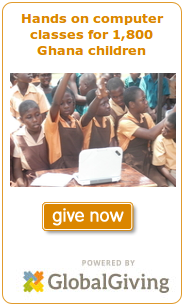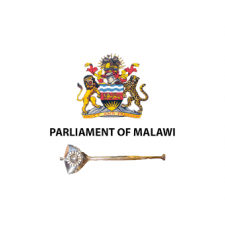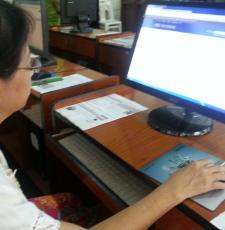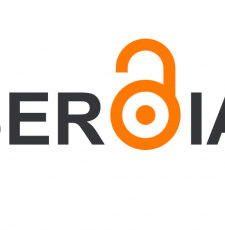The EIFL-supported ‘Hands-on computer classes for 1,800 Ghana children’ project has contributed to an 81% pass rate in the information and communications technology (ICT) exam at 17 schools in poor and rural areas of Ghana.
These results - which EIFL has just received - are for the Basic Education Certificate Examination (B.E.C.E.). The B.E.C.E. is crucial, because it is the exam that determines entry to secondary school. Children from poor families who fail the B.E.C.E. often drop out and face uncertain futures because their parents cannot afford to keep them in school.
Headmasters, teachers, parents and students all say the EIFL-supported project played a vital role in improving the pass rate.
With the support of donors through the online fundraising platform GlobalGiving, EIFL has been able to fund mobile libraries in four regions of Ghana (Ashanti, Upper East, Western and Volta) to travel to poor and rural schools that do not have computers, internet connections or reliable electricity.
The library vans are packed with solar-charged laptops, modem internet, screens and projectors. Each van has 15 laptops, pre-loaded with content related to school subjects like geography, mathematics, science and English. At the schools, the librarians and teachers conduct practical computer skills classes for the children, many of whom had never seen or touched a computer before the project began in 2015.
We’ve chosen the Hands-on computer classes project for our year-end fundraising campaign. Thank you to everyone who has donated and for contributing to these excellent exam results. There’s still time to help the mobile libraries reach more children. Click here to donate.
TOP MARKS FOR 2017
Here are some of the best results achieved by schools in the four regions reached by the mobile libraries in 2017:
- The mobile libraries taught over 3,000 children (1,732 boys and 1,404 girls) in grades 1, 2 and 3 at 17 schools to use computers and the internet.
- The hands-on classes increased the average ICT exam pass rate at B.E.C.E. level at the 17 schools to 81%. This is 36% more than the average achieved by schools taking part in the project in 2015.
- The biggest increase was in Upper East Region, where the average ICT pass rate at B.E.C.E. level jumped from 35% in 2015 to 91% in 2017.
‘A CLOUD OF EXCITEMENT’
Parents were overjoyed with the results. “I’ve seen improvement in my son Emmanuel’s ICT grades and there is a cloud of excitement around him when going to school,” said the guardian of a pupil at Kpenoe M.A. Junior Junior High School in Volta Region.
“The mobile library service has reshaped the quality of teaching and learning at our school by tackling the practical aspect of learning which has been a longstanding problem,” said Kumah Ntifafa, a teacher.
In Upper East Region the numbers of pupils in each class is high - sometimes, over 60 children. The two largest schools the library reached were Gaari Gbani Junior High School, where 286 children attended the library’s classes, and Tedam Junior High School, where the library taught 240 children.
“In these schools it’s a challenge. The children are eager to learn and are happy even when sharing the 15 laptops we bring - but ideally, we should have more laptops to improve learning,” said the Upper East regional librarian.
Watch EIFL’s video about the project and its impact at Abountem Junior High School in Ashanti Region.
SHARE / PRINT










